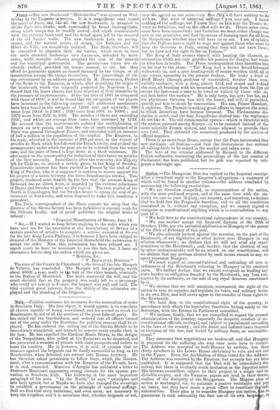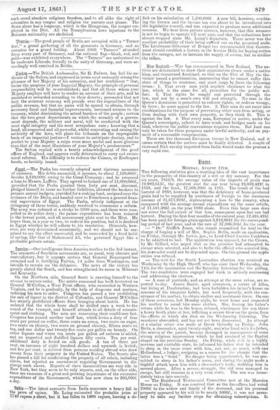ilitthiff.—The Hungarian Diet has replied to the Imperial rescript. After
a trenchant reply to the Emperor's allegations—a summary of which will be found in another column—the address concludes by announcing the following resolutions: " We are therefore compelled, as representatives of the nation, with the most profound respect, and at the same time with the sin- cerity we owe to your Majesty, our country, and ourselves, to declare that we hold fast the Pragmatic Sanction, and to all the conditions contained in it, without any exception, and we cannot regard or recognize as constitutional anything which is in contradiction to any part of it. " We hold firm to the constitutional independence of our country. " We can neither accept the Imperial diploma of the 20th of October, 1860, nor the intended application to Hungary of the patent of the 26th of February of this year. "We also solemnly protest against the exercise, on the part of the Reichsrath, of any legislative or other power over Hungary in any relation whatsoever; we declare that we will not send any repre- sentatives to the Reichsrath ; and, further, that the election of any by other instrumentality will be an attack on our constitution, and we declare that any persons elected by such means cannot in any re- spect represent Hungary.
" We must regard as unconstitutional and unbinding all acts or ordinances of the Reichsrath referring to Hungary or its annexed parts. We further declare that we cannot recognize as binding any state burden or obligation founded by the Reichsrath, any loan con- tracted by its authority-, or the sale of any royal demesne sanctioned by it.
" We declare that we will maintain, unimpaired, the right of the nation to vote its supplies and regulate its taxes, and military levies in its own Diet, and will never agree to the transfer of these rights to the Reichsrath.
" We hold firm to the constitutional right of the country, in accordance with vitae!' the legislative functions belong solely to the Sovereign, with the Estates in Parliament assembled.
" We declare, finally, that we are compelled to regard the present administration of the country, especially the despotic conduct of un- constitutional officials, as illegal, and subject to punishment according to the laws of the country; and the direct and indirect taxes imposed in violation of the law, and levied by military force, as unconstitu- tional."
They announce that negotiations are broken off, and that Hungary is prepared for the suffermg she may once more have to endure. The Address was accepted in both Houses by acclaim, less than thirty members in the Lower House abstaining to vote, and not one in the Upper. Even the Archbishop of Gran voted for the Address. The Address was received by the Emperor, but no reply has yet been published. It is supposed that the Diet will be immediately dis- solved, but there is evidently much hesitation in the Imperial mind. His German councillors adhere to their project of a single and in- divisible empire, and the Viennese papers are loud in their denun- ciation of the disloyalty of the Hungarians. The Magyar plan of action is unchanged, viz. to maintain a passive resistance and pay no taxes, but they have made a great effort to conciliate th sub- nationalities. Their plan is to consider Hungary one nation, t to guarantee to each nationality the free use of its own langn e, to
each creed absolute religious freedom, and to all alike the right of education in any tongue and religion the parents may please. The State alone has a language, which is the Hungarian, the tongue em- ployed in the Diet. All the Transylvanian laws injurious to the Rouman nationality are abolished.































 Previous page
Previous page